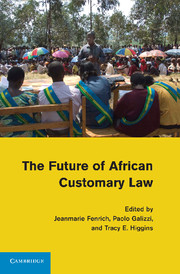Book contents
- Frontmatter
- Contents
- Notes on Contributors
- Acknowledgments
- Introduction
- Part One The Nature and Future of Customary Law
- Part Two Ascertainment, Application, and Codification of Customary Law
- 4 The Quest for Customary Law in African State Courts
- 5 The Withering Province of Customary Law in Kenya
- 6 Putting Old Wine in New Wine Skins
- 7 Traditional Authorities
- 8 Engaging Legal Dualism
- 9 The Future of Customary Law in Ghana
- Part Three The Role and Power of Traditional Authorities
- Part Four Customary Land, Property Rights, and Succession
- Part Five Customary Criminal Law
- Part Six Customary Law, Human Rights, and Gender Equality
- Index
- References
4 - The Quest for Customary Law in African State Courts
Published online by Cambridge University Press: 05 February 2012
- Frontmatter
- Contents
- Notes on Contributors
- Acknowledgments
- Introduction
- Part One The Nature and Future of Customary Law
- Part Two Ascertainment, Application, and Codification of Customary Law
- 4 The Quest for Customary Law in African State Courts
- 5 The Withering Province of Customary Law in Kenya
- 6 Putting Old Wine in New Wine Skins
- 7 Traditional Authorities
- 8 Engaging Legal Dualism
- 9 The Future of Customary Law in Ghana
- Part Three The Role and Power of Traditional Authorities
- Part Four Customary Land, Property Rights, and Succession
- Part Five Customary Criminal Law
- Part Six Customary Law, Human Rights, and Gender Equality
- Index
- References
Summary
Introduction
Customary law is a distinguishing feature in the landscape of contemporary Africa. In many countries, it continues to regulate people’s access to land, labor, and capital and to form the main normative system for dispute settlement. In recognition of the importance of customary law in the regulation of people’s lives, but also in an attempt to control the customary sphere to a certain extent, many African governments have granted state courts jurisdiction to decide cases on the basis of customary law. It is, however, not easy for a judge to ascertain the customary law applicable to a particular case. This difficulty flows partly from the multiplicity of different customary laws – varying widely from community to community, but also within communities – and partly from the fluid nature of customary law itself.
- Type
- Chapter
- Information
- The Future of African Customary Law , pp. 83 - 102Publisher: Cambridge University PressPrint publication year: 2011
References
- 6
- Cited by



